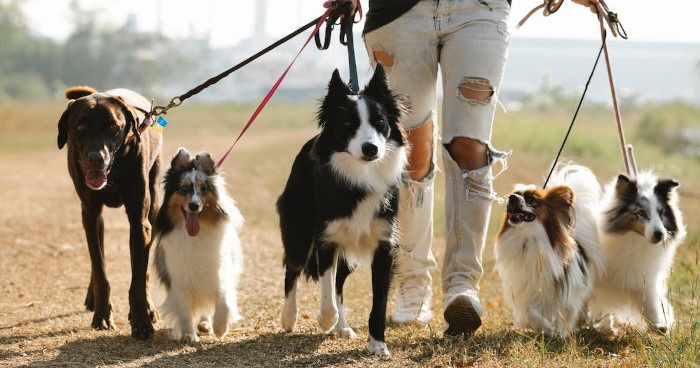As pet lovers, we must ensure our furry companions are happy and content. For readers of Tedece.com, where personal experiences mesh seamlessly with professional knowledge, this article seeks to offer holistic insights on canine care.
From dietary choices to mental stimulation, let’s unravel the little details that make a big difference in the world of our tail-wagging friends.

Why the right diet matters
Dietary choices for dogs influence their physical health, behavior, and overall temperament. As humans feel more energetic and upbeat with the right nutrients, so do our canine companions. By offering high-quality, balanced meals, you ensure your dog receives all the vital nutrients necessary for growth, energy, and a shiny coat.
For instance, dry food for dogs, which offers convenience and long shelf-life, should be chosen based on its protein content, the absence of fillers, and the inclusion of essential vitamins and minerals. Brands prioritizing real meat or fish as the primary ingredient, without relying heavily on by-products, are typically more beneficial.
Regular vet check-ups and premium zoo supplies
Its diet doesn’t solely dictate your dog’s health. Regular vet visits ensure timely vaccinations, deworming, and health checks.
Additionally, investing in quality zoo supplies—like chew toys, grooming brushes, and comfy bedding—can dramatically improve your dog’s quality of life. These tools cater to their basic needs and offer mental stimulation and comfort.
Physical activity and playtime: Beyond the walks
Dogs, irrespective of their size or breed, need regular physical activity. While daily walks are essential, playtime holds equal importance. Activities like fetch, tug-of-war, or agility courses (for the more energetic breeds) keep them mentally sharp and physically fit. Moreover, interactive toys can help keep them engaged when you’re occupied or away.
Training and positive reinforcement
Training isn’t merely a session of commands and behaviors; it’s a beautiful dance of communication between you and your dog. It establishes a bridge of understanding, trust, and mutual respect when done right. It’s crucial, however, to understand the psychology behind canine training to ensure an effective and loving learning experience.
Positive reinforcement – The key to successful training
Unlike outdated methods that rely on punishment or dominance, modern dog training emphasizes the value of positive reinforcement. This technique involves rewarding desired behaviors, making it more likely for the dog to repeat them in the future. Rewards can come in various forms: treats, verbal praises, petting, or even their favorite toy.
For example, if you’re training your dog to sit, immediately reward them the moment they follow through with the command. This instant feedback helps them associate the action with positive outcomes.
The multi-faceted benefits of training
Aside from the obvious obedience benefits, training sessions are also a valuable bonding time. They instill confidence in shy dogs, offer mental stimulation, and can even alleviate specific behavioral issues.
More importantly, a well-trained dog has more freedom. They can be trusted off-leash, welcomed in more public places, and can generally enjoy a fuller, richer life with their human.
Social interaction and exploration
Dogs are not just domestic creatures; they are explorers at heart. Each scent, sound, and sight is a story to discover. By introducing them to diverse environments, people, and other animals, you are opening a window to the world for them, offering them countless stories to explore.

The importance of early socialization
Introducing your dog to various stimuli at a young age, often called socialization, is crucial. Puppies have a ‘golden period’ (typically between 3 to 14 weeks of age) where positive exposures can dramatically shape their adult behaviors. Well-socialized dogs are usually more confident, less fearful, and better equipped to handle changes in their environment.
Balancing interaction: Playdates and quiet times
While social interaction is vital, striking a balance is also essential. Regular playdates with fellow canines can be a treat for your dog, teaching them vital communication skills. However, just as humans sometimes need downtime, so do dogs. Ensure they have a quiet, safe space at home where they can retreat and relax if they feel overwhelmed.
Exploration beyond the neighborhood
While daily walks within the neighborhood are beneficial, occasionally, taking your dog to new environments can be immensely stimulating. A trip to the beach, a hike in the woods, or even a day in a dog-friendly cafe can offer many new experiences.
These outings provide sensory stimulation and strengthen the bond between you and your canine companion as you explore the world together.
Conclusion: A journey of mutual joy
For regular visitors of Tedece.com, the emphasis has always been on amalgamating professional insights with real-life experiences.
Caring for a dog is no different. While there’s no one-size-fits-all approach, the core principles remain the same: prioritizing their health, happiness, and holistic well-being. Remember, when your dog thrives, the joy and love they reciprocate are unparalleled.
You can also check out some interesting hobbies to discover and what gifts to buy for a man.

